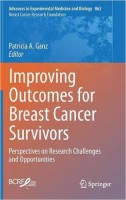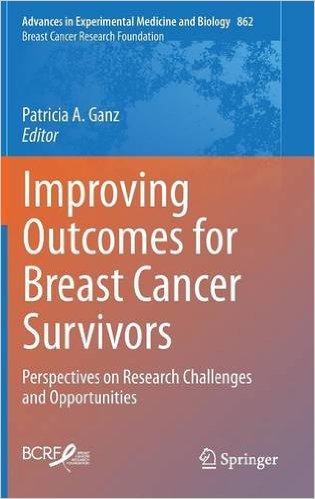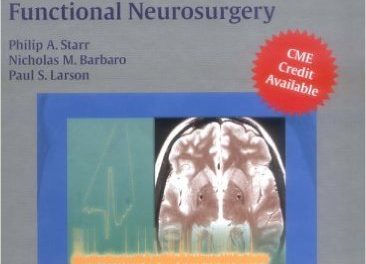 Part of the Advances in Experimental Medicine and Biology Series of the Breast Cancer Research Foundation
Part of the Advances in Experimental Medicine and Biology Series of the Breast Cancer Research Foundation
Editor: Patricia A. Ganz, MD
Series Editors: Larry Norton, MD, and Clifford A. Hudis, MD
Publisher: Springer International Publishing – 273 pages
Book Review by: Nano Khilnani
Almost one-fourth of the 14 million cancer survivors in the United States were at some point diagnosed with breast cancer. It’s the most common cancer among women in the U.S. That works out to 3.5 million people, or almost 1.1 percent of the country’s population of 320 million.
The management of breast cancer typically involves some or all of these areas (though not in this order): diagnosis (including mammography), medical oncology, medication, pathology, radiology, surgery (including tumor removal and breast reconstruction), and therapy (chemotherapy and / or radiation).
Better management of breast cancer in the last two decades have helped dramatically increase the number of survivors, who numbered three million, representing 41 percent of female survivors of all types of cancer. Still, about 40,000 women are lost to breast cancer each year in the U.S. Much work needs to get done to lower that number.
This book was published by Springer International in collaboration with the Breast Cancer Research Foundation (BRCF). Its editors named above are affiliated with BRCF.
Founded by Evelyn H. Lauder in 1993, BRCF has raised more than $550 million until 2015 and worked on discoveries in the biology of tumors, genetics, and metastasis, as well as on prevention, public awareness, survivorship and treatment of breast cancer.
The focus of this ongoing collective effort has been to improve the outcomes for patients with breast cancer. Part of that goal is to share the information gathered with everyone concerned, through the publication of this volume.
This book was written to disseminate the findings of the investigative work as well as the programs of the BRCF to all those concerned – doctors involved in caring for breast cancer patients, their families and friends, and anyone who wants to learn more about this deadly disease. Readers are urged to go to www.brcfcure.org.
The editors and contributors – 16 of them, who are involved in clinical practice (diagnosis and treatment) and/or lab work – wrote the 17 chapters of this book over a 12-month period. We list the chapter titles below for your overview, and to serve as a guide to the subjects covered in it.
- Breast Cancer Survivorship: Where Are We Today?
- Special Issues in Younger Women with Breast Cancer
- Special Issues in Older Women with Breast Cancer
- Breast Cancer Among Special Populations: Disparities in Care Across the Cancer Control Continuum
- Symptoms: Fatigue and Cognitive Dysfunction
- Symptoms: Chemotherapy-Induced Peripheral Neuropathy
- Symptoms: Aromatase Inhibitor Induced Arthralgias
- Symptoms: Lymphedema
- Symptoms: Menopause, Infertility, and Sexual Health
- Host Factors and Breast Cancer Recurrence; Genetic, Epigenetic, and Biologic Factors and Breast Cancer Outcomes
- Comorbidities and Their Management Potential Impact on Breast Cancer Outcomes
- Modifiable Lifestyle Factors and Breast Cancer Outcomes: Current Controversies and Research Recommendations
- Risk Reduction from Weight Management and Physical Activity Interventions
- Prevention and Treatment of Cardiac Dysfunction in Breast Cancer Survivors
- Psychological Adjustment in Breast Cancer Survivors
- Living with Metastatic Breast Cancer
- Quality of Care, Including Survivorship Care Plans
The editors point out importantly in their Preface that the experiences of patients who have breast cancer, the length of their survival, and the quality of their lives after treatment vary greatly, depending on the following factors:
- Access to care and receipt of appropriate treatment
- Age (typically between 50 and 70 years old, with exceptions)
- Level of psychosocial support
- Partnership status
- Place of residence, particularly urban or rural areas
- Socioeconomic factors
All in all, this is a highly informative book.
Editor:
Patricia A. Ganz is Distinguished Professor of Health Policy & Management and Medicine in the Fielding School of Public Health at David Geffen School of Medicine at UCLA; and Director of Cancer Prevention & Control Research, and Jonsson Comprehensive Cancer Center in Los Angeles, California.
Series Editors:
Larry Norton, MD is Physician-in-Chief for Breast Cancer Programs; Medical Director of Evelyn H. Lauder Breast Center; Norma S. Sarofim Chair in Clinical Oncology at Memorial Sloan Kettering Cancer Center; and Scientific Advisor of the Breast Cancer Research Foundation.
Clifford A. Hudis, MD is Attending Physician and Chief of Breast Medicine Service at Memorial Sloan Kettering Cancer Center; Professor of Medicine and Co-Leader of Breast Disease Management at Weill Cornell Medical College; and Chairman of the Advisory Board of the Breast Cancer Research Foundation.






